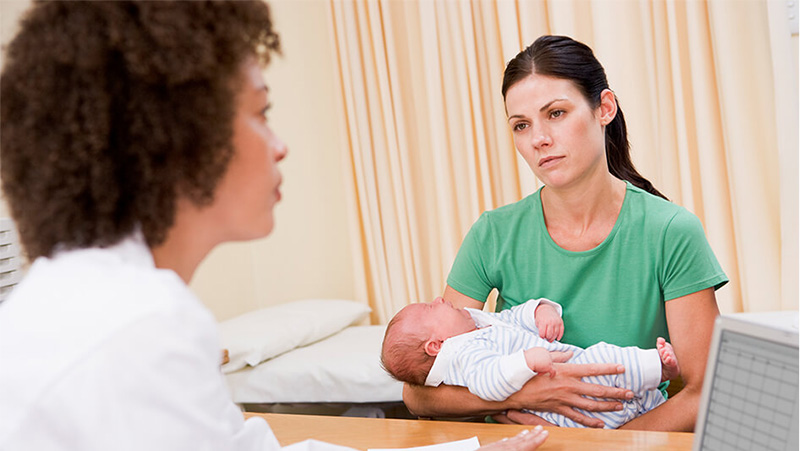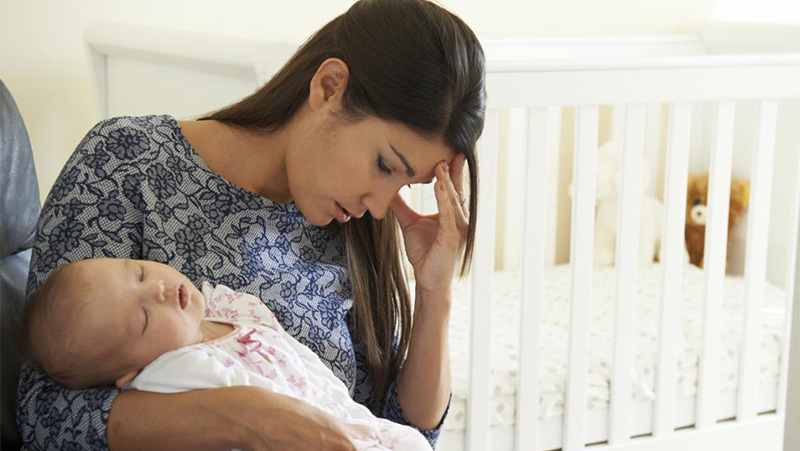Giving birth to a baby brings a lot of different emotions starting from feeling happy to excited, but in some cases, women also feel sad or worried. This unexpected feeling is called post-pregnancy depression. New moms going through it need support, empathy, and information regarding the same. Understanding this often less-known condition is important.
What is PPD?
After the delivery, some women feel low or sad called perinatal or postpartum depression (PPD). It is a serious medical condition that is quite common, impacting 1 in 7 new mothers. If you're experiencing intense feelings of extreme sadness or severe mood swings, you might be dealing with perinatal depression.
Remember you're not alone in this and there's 24*7 help available. Talking to your healthcare provider can make things better for you.

Postpartum Depression Symptoms
It's normal for new moms to feel sad or tired a few days after delivering a baby, which is called "baby blues." However, post-pregnancy or perinatal depression is more serious and can last for weeks after giving birth to your baby making it difficult to do basic regular things.
The symptoms of post-pregnancy depression are different for every woman and can change daily, starting anytime after having a baby. Perinatal depression symptoms often seem to begin 1 to 3 weeks after the child is born making you feel detached from your baby.
Other signs include—
- Feeling extremely sad or crying a lot
- Not being interested in the baby
- Thoughts about hurting the baby or yourself
- Less energy or motivation
- Trouble falling asleep
- Feeling worthless as a parent
- Feeling anxious
- Change in diet
- Having headaches, distress, pains, or even stomach problems
Remember, having post-pregnancy depression doesn't mean you're a bad mother, it's not your fault. If you notice any of these signs, talk to your medical professional and things will get back to normal.
Causes and Risk Factors
Various reasons can cause PPD in a new mom, and these reasons can differ from person to person. Some things that might increase the chances of perinatal depression include—
- Feeling unsure or having mixed feelings about your pregnancy
- Hormonal changes
- Having a history of depression either before or during pregnancy (Prenatal Depression)
- Teen pregnancy
- Going through really tough times, like losing a job or facing a health crisis
- Having twins or triplets
- Having a child with special needs or health problems
- Having a condition called premenstrual dysphoric disorder (PMDD)
- Having less supportive family or friends
- Having problems in your marriage or relationship
- Living by yourself
- Getting less sleep
- Anxiety
PPD can stick around for a whole long year after your baby’s birth. But even after a year, it doesn't mean that you will automatically recover from it. Talking to your doctor can make things better.

Diagnosis and Treatment
There is no special test for detecting PPD. Your doctor will examine your health history, and how you've been feeling after the delivery during your routine checkup. They might also perform a physical and pelvic examination and conduct a few lab tests for the same.
It is important to be honest about your condition with your doctor so they can figure out if your feelings are normal that every new mother goes through or if they might be symptoms of post-pregnancy depression. PPD treatment completely depends on how you feel and the intensity of its symptoms. There are different ways to help you recover from PPD, like taking anxiety or anti-depression pills, talking with a therapist, and joining support groups.
What if My PPD is Not Treated?
Not getting adequate help for post-pregnancy depression is risky and can affect you, your baby, and the people around you. It might make you—
- Feel moody.
- Feel low in energy.
- Think negative things about your baby.
- Have thoughts about hurting yourself.
How to Cope with Post-Pregnancy Depression
Feeling emotional is normal, especially when you're a new mom because taking care of a baby can be a challenging task. If you're going through difficult times and feeling down, you don't have to handle it all by yourself. Your doctor can help you find a way to feel better.
Here are some things you can do to deal with PPD—
- Join a group where new parents share their experiences.
- Talk to someone—like a therapist, doctor, friend, or family member—who will listen and support you.
- Make sure to get enough rest. You can reuse your pregnancy pillow in such cases to recreate the comfort and support you are used to.
- Have a healthy diet and indulge in workouts and exercises.
- Take care of yourself by doing things you enjoy, like reading or watching movies.
- Spend time with your loved ones.
ELI&ELM SPECIAL OFFER!
Post Pregnancy Preventions
PPD isn't entirely preventable. It doesn’t vanish instantly but goes off with time. Here are some tips that can help prevent post-pregnancy depression:
- Limit visitors when you first go home after your delivery.
- Try to be realistic about your expectations for yourself and your baby.
- Ask for help— let others know how they can help you.
- Exercise— going for a walk might feel better.
- Foster your relationship with your partner— make time for each other.
- Keep in touch with your family and friends— don't isolate yourself.
- Be realistic—Expect some good days and some bad days.
When to Seek Medical Help

If you're feeling emotionally low after having a baby, it's normal to feel hesitant or shy to talk about it. But if you notice signs of depression, reach out to your doctor immediately.
Call your doctor right away if:
- The symptoms don't go away after two weeks.
- They make it difficult for you to take care of your baby.
- Everyday tasks become challenging.
- The symptoms seem to get worse day by day
- You have thoughts of hurting yourself or your baby.
The Bottom Line
Postpartum or post-pregnancy depression can be tough, but you can overcome it with the right understanding, awareness, and support. Talking openly about mental health is looked down upon but the right help at the right time is what is necessarily required.
Eli & Elm believes in empowering moms to seek help without any hesitation, also creating a world where every woman feels supported in the challenging yet beautiful journey of motherhood.
Sources:
Cleveland Clinic: Postpartum Depression
Healthline: Everything You Need to Know About Postpartum Depression: Symptoms, Treatments, and Finding Help





















